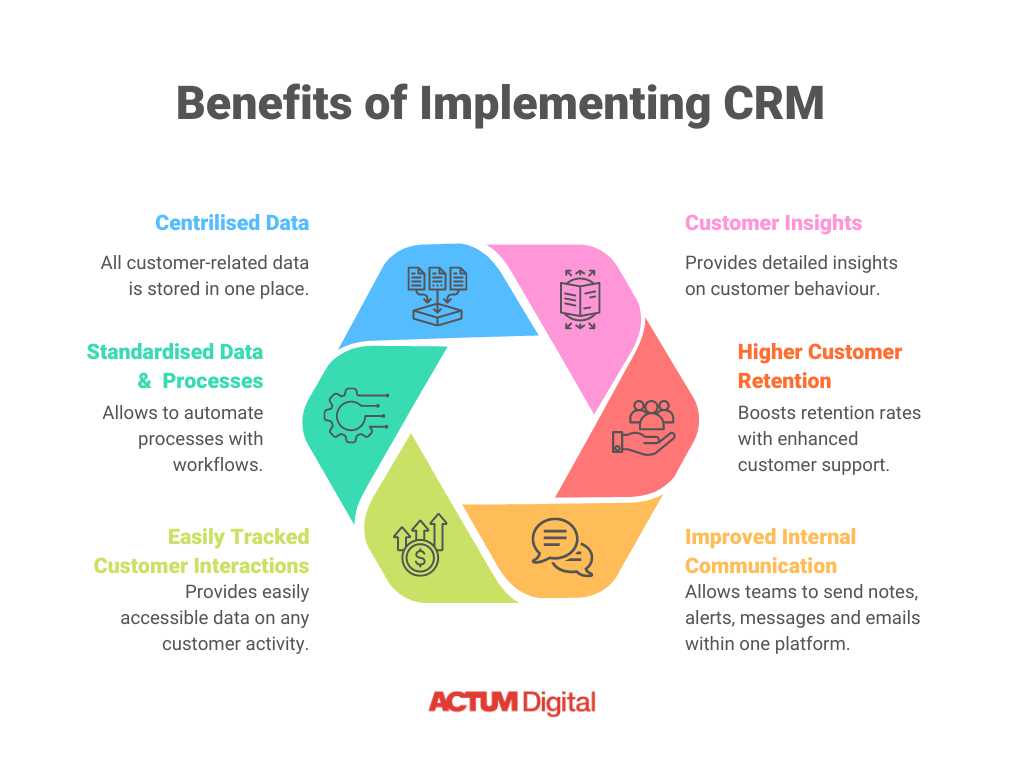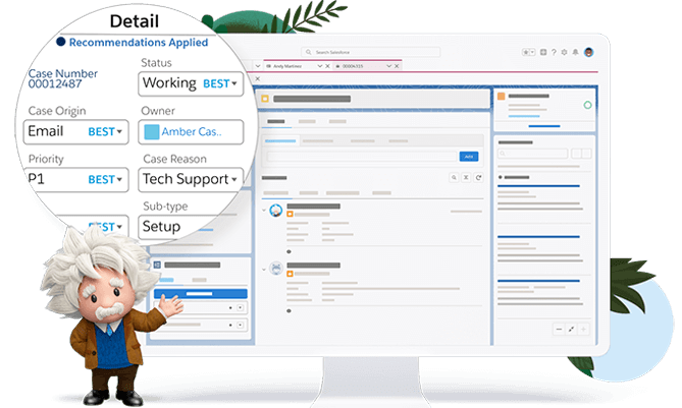How Salesforce CRM helps manufacturers improve collaboration and communication
The concept of distributed workforces is certainly not new in Europe. As of 2019, about 30% of employees in countries such as Sweden, Finland, and the Netherlands worked from home. However, the COVID-19 pandemic led to an increase in the prevalence of remote work. For context, the share of employed people in the EU working from home rose by 8.0 percentage points between 2019 and 2021. While having teams that work from different locations has advantages – for example, increased employee productivity and cost savings – it can weaken communication.
The consequences of ineffective collaboration could be dire for manufacturing companies. Therefore, manufacturers are searching for new strategies to smoothen communication and collaboration between departments and across locations, and customer relationship management (CRM) is one such strategy worth deploying.

Why should manufacturers focus on improving communication and collaboration?
The quality of output and smoothness of workflows in a manufacturing company is highly dependent on the level of communication within the company. Product development teams must accurately communicate design specifications and modifications to the staff on the production floor. Also, shift workers must ensure completeness of information during handovers, and sales teams must communicate customer feedback to product development staff for more innovation.
There are several benefits to maintaining the flow of information in the organization. They include:
- Improved efficiency in production
By maintaining healthy communication channels, manufacturing companies will experience greater productivity of up to 25%, according to McKinsey. - Increased innovation and creativity
Spending less time addressing production errors resulting from miscommunication frees up valuable hours. Product development, sales, and marketing teams can use the time to develop more effective strategies to fulfill their duties. - Fewer workplace accidents
Clear communication of safety protocols and emergency preparedness to workers reduces risks of accidents and injuries during production. - Higher staff retention
Effective communication boosts productivity and lessens workplace failures, which improves employee satisfaction. Hence, companies that engage staff will have higher retention rates. - Enhanced customer satisfaction
Manufacturing teams that communicate effectively will launch more quality products while achieving faster time-to-market. Such efficiency and productivity will delight customers, enhancing satisfaction and loyalty.
What are the challenges hindering effective communication in the workplace?
While the benefits of communication are evident, the complexity of workflows in manufacturing presents unique barriers to effective information sharing. Here are some of the biggest communication challenges manufacturers face:
Lack of effective communication channels
Traditional communication channels can hinder productivity, especially for diverse teams in hybrid work environments. Urgency gets lost in lengthy email threads, while phone call records become a burden to maintain. Moreover, ineffective channels create gaps in real-time information sharing, impacting decision-making and production output.
Difficulty in tracking project progress
Operating with a distributed workforce makes project tracking difficult. Think about manufacturing operations: complex workflows, interdependent tasks. Changes to design specifications or scheduling can lead to a wrong estimate of the production timeline. Furthermore, the absence of a centralized system creates difficulties in task assignments, making it a struggle for department heads to accurately track pending projects.
Siloed departments
The tendency of departments to operate in siloes is high in many organizations. Siloed departments worsen the problem of poor communication. For example, it could cause marketing to be unaware of possible delays in product launches due to a dissatisfied quality assurance team. The consequences of such silos include significant financial losses and workplace conflicts.
How can CRM improve collaboration and communication among manufacturing teams?
One way for businesses to address the above-mentioned challenges is by implementing Customer Relationship Management (CRM) software.
Imagine having a powerful tool that tracks and organizes every customer interaction: their experiences, journeys, communications, and requests. With CRM, this valuable information is stored in a central location, making it easily accessible to marketing, sales, accounting, and product development teams.
By streamlining communication within your organization, CRM eliminates the hassle of searching for scattered information. It's all in one place, ready to be accessed when needed. This boosts communication between departments and key players, enhancing collaboration and efficiency. Integration with other enterprise applications like ERP or PIM, makes it the ultimate tool for sharing information across departments and locations.

Here’s how a CRM can improve communication and collaboration, particularly as your manufacturing business shifts to a distributed workforce:
Centralized communication platform
CRM software provides a platform for manufacturing teams to centralize correspondence. It offers communication tools such as instant messaging and chat features on the platform. This means communication history is universally accessible and easily searchable.
Hence, new team members can access old communication threads and join recent discussion boards. Members from sales can easily exchange ideas with their counterparts from production. Insights can easily be swapped between different company branches through document sharing.
With CRM, effective communication channels are always open within your organization.
Real-time information exchange
Access to up-to-date information is important in manufacturing companies. Poor interdepartmental communication could seriously affect revenue and cause supply chain disruptions.
For example, assume there is an unexpected breakdown of critical equipment on the production floor. If this information is not shared with maintenance, repairs cannot be scheduled promptly, and the production schedule slows significantly.
By providing real-time data-sharing capabilities, CRM prevents such scenarios that impact productivity. Instead, the software promotes the coordination of activities for the smooth running of the organization.
Workflow automation
CRM has robust automation capabilities that are great for improving collaboration.
For example, CRM software can automatically assign tasks to team members during shift handovers. Also, the software can send notifications and reminders for upcoming meetings and deadlines to relevant workers. CRM also automates calendar management so teams can easily coordinate meetings and schedule appointments.
These automation functionalities eliminate the effect that human forgetfulness and errors may have on manufacturing efficiency.
Applying CRM in the manufacturing industry: a case study of Schneider Electric’s success using Salesforce CRM
Of all the CRM software vendors available, few are as well suited to the manufacturing industry as Salesforce CRM is. Different manufacturing companies have experienced great success integrating Salesforce CRM into their operations. The best example is Schneider Electric, a French multinational giant specializing in energy management and automation.
As a rapidly growing brand, Schneider Electric regularly acquires new companies to expand its reach. The energy supplier operates in over 115 countries and employs over 120,000 people worldwide. Additionally, it has an increasingly mobile workforce. Previously, this made it difficult for Schneider to achieve the interconnectedness necessary for progress. Schneider needed a CRM. Different solutions were tried, but adoption rates were low.
Upon turning to Salesforce’s versatile platform, Schneider Electric found a fitting CRM solution. Salesforce’s scalable cloud-based model allowed Schneider to connect all its employees and suppliers worldwide. By providing a single source of truth for Schneider, Salesforce helped foster an ecosystem for effective communication. For Schneider Electric, this has led to an increase in revenue and customer satisfaction through the years.
How EinsteinGPT enhances internal communication through generative AI
On March 7, 2023, Salesforce launched EinsteinGPT, the world’s first generative AI for CRM. With this exciting addition, Schneider Electric and other manufacturing companies that choose Salesforce CRM are set to enjoy seamless communication and collaboration throughout the organization. This will be possible thanks to the features EinsteinGPT brings to Salesforce CRM.

EinsteinGPT revolutionizes the CRM by automating routine communications like emails, reports, and meeting summaries. It also offers knowledge management and training, benefiting new employees. This AI understands company processes, products, and policies, providing prompt information when needed.
Additionally, it assists in tracking meeting minutes, tasks, and project timelines, boosting productivity. With EinsteinGPT integrated, Salesforce creates an optimal platform for manufacturing teams to stay connected, making work easier and more efficient.
Additional strategies to implement for better communication and collaboration
A workforce does not have to be disconnected because it is distributed across different departments and locations. Here are some additional strategies to try to boost communication and teamwork in your organization:
Encourage bottom-up communication
While top-down communication is essential in any corporate office, it is crucial to let your employees have a say. Create an inclusive environment where everyone can share their thoughts, regardless of position.
Use surveys, questionnaires, and one-on-one talks to gather valuable feedback. Regular meetings foster communication. From the workers on the production floor to the desk employees in accounting, lower-level staff has a wealth of experience that could prove insightful.
Hence, encouraging bottom-up communication ensures your company grows at all levels.
Optimize employee experience
Every manufacturer wants to create memorable experiences for their customers. However, achieving this goal involves retaining the best minds and hands. Therefore, optimizing the employee experience in your company is equally important.
Do this by encouraging employee feedback to make them feel heard. Also, reward workers who embody the values of hard work and collaboration. In addition, celebrate birthdays and life milestones throughout the company. This way, employees feel special and are less likely to leave.
Try team-building exercises
Team building exercises are great for improving communication and collaboration in an organization. This is because these exercises help build new relationships within the company and strengthen existing ones.
During these exercises, form teams from people in different departments or branches. Subsequently, these cross-functional teams can engage in problem-solving challenges involving issues within the company. This may include quality control challenges or production workflow issues. Team building exercises may also take place in social settings. Try activities such as treasure hunts, escape rooms, and board games.
Final words
Effective communication and collaboration are crucial for your manufacturing company's success. Team-building exercises and bottom-up communication can greatly improve them. However, a centralized communication platform like a CRM is still necessary. This software enables real-time information sharing and workflow automation to keep your distributed workforce connected. Think of it as the glue that holds everything together. Schneider Electric’s implementation of Salesforce CRM is a great example of the exciting possibilities the system can offer. However, the implementation requires a technical specialist, and onboarding of employees can be challenging.
______________
At ACTUM Digital, we excel at full-service implementations, where we dive deep into your processes, challenges, and desires. Together, we'll implement a CRM solution that simplifies your employees' lives and enhances communication.
Written by

Miroslav Hyrman
CRM expert at ACTUM Digital. You can find me on LinkedIn
You may also like...
[11/05/2023] Challenges Manufacturers Face in Managing Sales and Marketing Data
Learn about the key challenges manufacturers face in managing sales & marketing data, how to address these issues and improve business outcomes.
Read the Insight[21/04/2023] Why Should Be Paying More Attention to CRM
Are you still managing your customer relationships with outdated methods, risking major miscommunications and loss of trust? Find out why implementing a CRM tool is a must.
Read the Insight